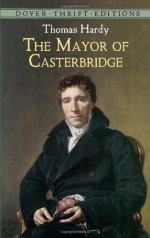
|
| Name: _________________________ | Period: ___________________ |
This test consists of 5 multiple choice questions, 5 short answer questions, and 10 short essay questions.
Multiple Choice Questions
1. Where does Michael ask Susan to meet after learning she is still alive?
(a) The Cricket Grounds.
(b) Gladiator's Hall.
(c) The Coliseum.
(d) The Ring.
2. Henchard's education is compared to whom?
(a) Aristotle.
(b) Aeneas.
(c) Plato.
(d) Achilles.
3. Henchard confesses his past marriage with Susan to Farfrae. What additional surprise does Henchard confess to Farfrae?
(a) Henchard is having an affair with a woman from Jersey.
(b) Henchard secretly drinks.
(c) A Jersey woman is blackmailing him about his past.
(d) Henchard knows the wheat is bad when he sells it.
4. What does Susan fear about meeting Michael Henchard?
(a) That he does not help despite financial success.
(b) That he's drunken himself to his tomb.
(c) That he considers his sale binding.
(d) That he does not remember their daughter.
5. What is one of Henchard's motives for his remarriage with Susan?
(a) He is obliged by an oath he makes nineteen years ago.
(b) To punish himself.
(c) A married man is more respectable than a bachelor.
(d) To find love again.
Short Answer Questions
1. How does Susan know Michael Henchard is in Casterbridge?
2. What does Farfrae do at the hiring market?
3. Where do Susan and Elizabeth Jane go for lodgings?
4. What does Henchard suggest to announce in the paper?
5. In chapter 19, what act blatantly shows Michael's disrespect for Susan's request?
Short Essay Questions
1. Henchard becomes distraught and angry at the idea that Elizabeth is not his daughter. Out of pride, he does not tell her after the big deal he makes for her to change her name. How does Henchard express his feelings if not in telling her the truth?
2. When Susan is auctioned to Newson, she thinks it is binding. However, Hardy remarks that she is not the only woman to think this way. What does this say about Susan? About the times?
3. Earlier in the book, Jopp is tersely introduced and forgotten when his management position is taken by Farfrae. Re-introduced years later in chapter 26, he is described as coming from the back slum and his clothing a sign of need. Unjustly fired, what role do you think Jopp plays in Henchard's life?
4. Henchard is a man of wealth and status in Casterbridge, yet he is lonely in friendship as well as marriage. As soon as he meets Farfrae, he is intrigued. Not only does he look to Farfrae as a business manager, but also as a friend. What benefits and dangers does Henchard risk in befriending Farfrae so early on with such sensitive confessions?
5. A raging bull attacks Lucetta and Elizabeth. Why does hardy use a bull? What symbolism do bulls represent?
6. Elizabeth mentions "respectability" several times. Despite a plain dress and a modest upbringing, she is very conscientious of being respectable. How does this regard to respectability portray her desires? What kind of life does Elizabeth seek?
7. Hardy introduces Lucetta as a mystery woman, but with some hints that she knows Henchard. He also describes her as graceful and nice to Elizabeth. However, as the novel progresses, how does Hardy foreshadow that Miss Templeman may not be the woman Elizabeth thinks she is? What clues and observations does Elizabeth make, or comments of Hardy, show that Lucetta is as contriving as the other characters in Casterbridge?
8. At first request, Michael is agreeable to let Elizabeth leave and gain independence. But when the time comes for her to leave, he gets angry and flustered at the idea. Why does Henchard react with such contradiction?
9. Henchard hears from Lucetta and believes he should marry her. At this point, Susan is on her deathbed. Why does Henchard want to marry Lucetta? Is it another obligation? Does he have feelings for her?
10. When Henchard writes a note to Susan, he also gives five guineas in return. What does Henchard hope to portray in this gift? How does Susan react to the money when she sees it?
|
This section contains 1,778 words (approx. 6 pages at 300 words per page) |

|




